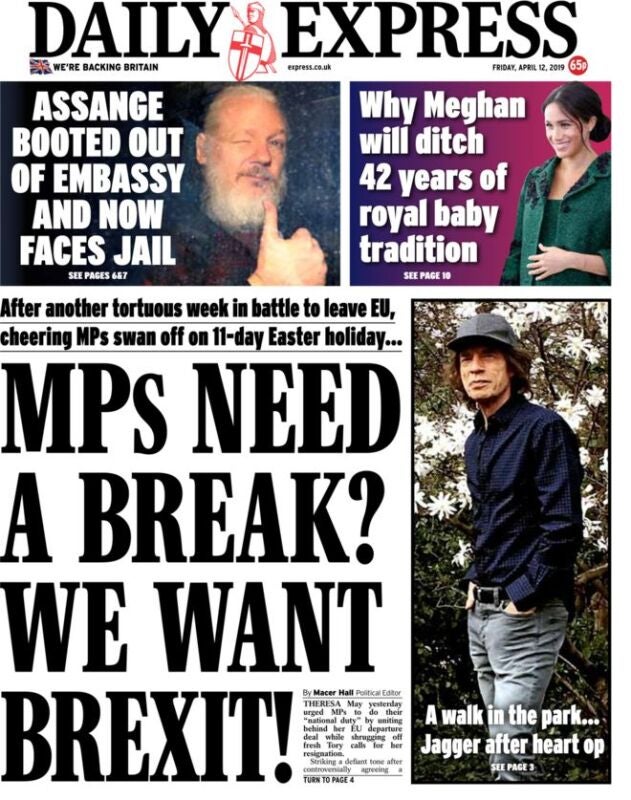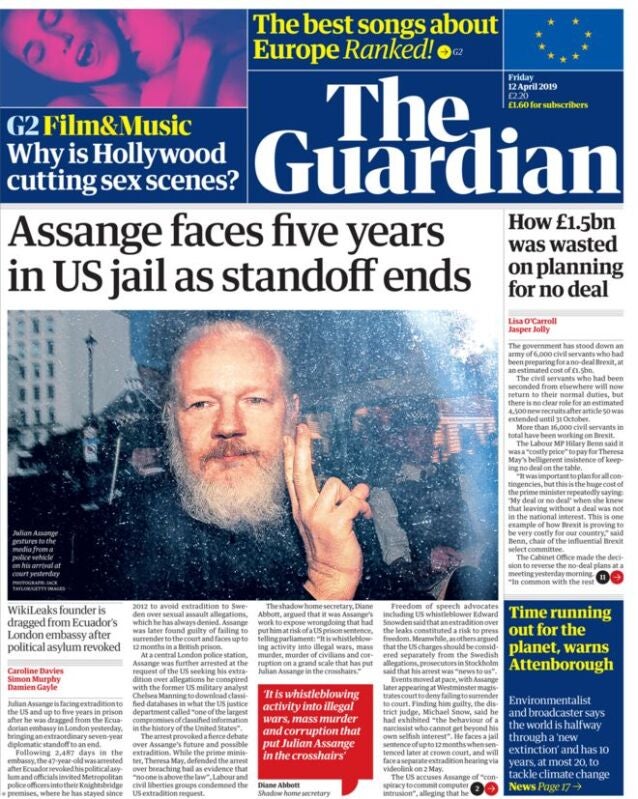
Jeremy Corbyn has called for the Government to oppose Julian Assange‘s extradition to the US over allegations that he conspired to hack into a classified Pentagon computer.
The Wikileaks co-founder was dramatically arrested at the Ecuadorian embassy in London yesterday, where he had been holed up for almost seven years.
His arrest made the front pages of most UK national newspaper front pages today, with images of him taken from the back of a police van. The press missed the moment of his actual arrest, however.
Scroll down for national newspaper front pages
The 47-year-old faces up to 12 months in a British prison after he was found guilty of breaching his bail conditions, while the US charge could attract a maximum jail sentence of five years, according to the US Department of Justice.
But Wikileaks editor Kristinn Hrafnsson said he fears more charges will be added, meaning Assange could face decades in a US prison.
Theresa May, Home Secretary Sajid Javid and Foreign Secretary Jeremy Hunt all saidAssange‘s arrest on Thursday showed that no-one is “above the law”.
But Labour leader Corbyn said Assange should not be extradited to the US to face a charge of conspiring with former army intelligence analyst Chelsea Manning to break into a classified government computer.
He tweeted: “The extradition of Julian Assange to the US for exposing evidence of atrocities in Iraq and Afghanistan should be opposed by the British government.”
He was retweeted by Pamela Anderson, one of Assange‘s most famous supporters, who has previously described Corbyn as “clearly a decent and fair man”.
Assange’s mother, Christine Assange, also took to Twitter to defend her son, who she said was “sick and in pain from prolonged detention and torture”.
In the US, Hillary Clinton said Assange should “answer for what he had done”, while Donald Trump declared he knows “nothing about Wikileaks” when asked about the arrest.
The president praised Assange during the final weeks of the 2016 presidential campaign and welcomed the political boost when the organisation released emails damaging to Clinton.
Following his arrest, Assange, with grey hair tied into a ponytail and sporting a long beard, appeared at Westminster Magistrates’ Court, where a judge accused him of behaving like a “narcissist”.
The growing row over the extradition comes as a man, said to be Swedish software developer Ola Bini, was held at Quito airport as he prepared to board a flight bound for Japan on Thursday.
Ecuador’s interior minister, Maria Paula Romo, said a person with links to Assange had been arrested for allegedly conspiring against the country’s government.
The Ecuadorian government had historically been sympathetic to Assange‘s cause, but a regime change two years ago heralded a less supportive approach.
The country’s ambassador to the UK, Jaime Marchan, said that in the time Assange had remained in the embassy he had been disrespectful, “continually a problem” and interfered in elections, politics and the internal affairs of other countries.
Marchan added: “He has said that we were spying on him, he has said we were lying, we were agents of the United States.”
However, Hrafnsson said Assange had been thrown “overboard” by Ecuador, adding: “I thought it was horrible to treat an individual like that. I thought it was disgraceful the Ecuadorians would go back on their word.”
He said a Grand Jury investigation included charges which could lead to decades in prison or even the death penalty under the Espionage Act 1917, although UK Government policy is to block extradition to countries where suspects might face capital punishment.
Australian Prime Minister Scott Morrison said that, as a citizen of the country, Assangewill have consular assistance available to him but will not get “special treatment”.
He spent almost seven years in the Ecuadorian embassy, where he sought political asylum in 2012 when he failed in his legal battle against extradition to Sweden, where he was wanted over two separate allegations – one of rape and one of molestation.
In May 2017, Sweden’s top prosecutor dropped the long-running inquiry into a rape claim against Assange, which he has always denied.
But his arrest prompted the lawyer for a Swedish woman who alleged she was raped by Assange during a visit to Stockholm in 2010 to say they wanted the case reopened.
Elisabeth Massi Fritz, who represents the unnamed woman, said news of Assange‘s arrest was “a shock to my client” and something “we have been waiting and hoping for since 2012”.
Massi Fritz said in a text message sent to the Associated Press that “we are going to do everything” to have the Swedish case reopened “so Assange can be extradited to Sweden and prosecuted for rape”.
She added that “no rape victim should have to wait nine years to see justice be served”.
Prosecutors in Sweden have since confirmed that, while the investigation has not been resumed, they are looking into the case.









Email pged@pressgazette.co.uk to point out mistakes, provide story tips or send in a letter for publication on our "Letters Page" blog

